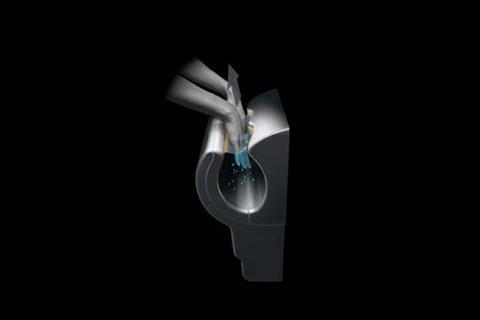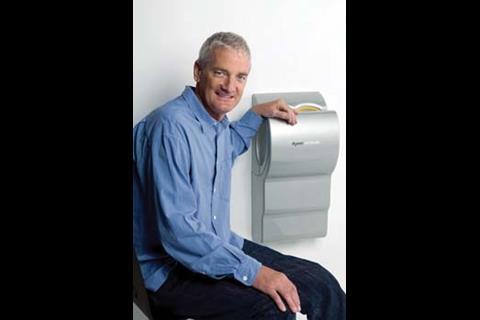James Dyson shows off his latest invention, designed to speed up toilet trips. Plus all the latest in thermostats, lighting control and an award-winning office
Dyson turns his hand to dryers
Even Sir James Dyson has experienced the shortcomings of electrical hand dryers. We’ve all been there – after what seems like an age of holding damp palms under the hot air nozzle, you give up and wipe them on your clothes. And this is what prompted Dyson to launch his latest innovation, the Dyson Airblade.
Unlike conventional dryers which blast warm air at your hands, the Dyson Airblade creates a sheet of high velocity, unheated air traveling at 400 mph that, effectively, wipes the water off your hands to leave them dry.
“Instead of painfully slow evaporation, the Dyson Airblade creates a high speed sheet of air, the ‘blade’, which gently squeegees your hands dry. It’s very quick and very clean,” says Dyson.
It is claimed that the Airblade takes just 10 seconds to leave a pair of hands dry and that it is more hygienic. This is partly because with dry hands you are less likely to pick up germs, but also because users don’t need to rub their hands together, which brings up bacteria from lower skin layers and underneath fingernails which damp hands can spread more easily.
The air that is blown though the 0.03 millimetre gap to create the blade is first passed through a HEPA filter, removing 99.97% of bacteria, while the water that is pulled off the hands is treated with an iodine resin microfilter which removes 99.9% of bacteria.
The disinfected water is then atomised using an oscillating crystal plate, and released as a harmless invisible mist.
What facilities managers will probably be most interested in is that the unit uses around 80% less energy than a conventional warm air dryer. This is a result of its shorter running time and the absence of a heating element, and also the efficiency of the 1600 W digital motor.
A Dyson Airblade costs £549, compared with a conventional hand dryer which typically retails at between £100 and £375.
However, Dyson argues that, despite the higher purchase price, the dryer will still cost at least 20% less to own and run over a five-year period.
Source
Building Sustainable Design





















